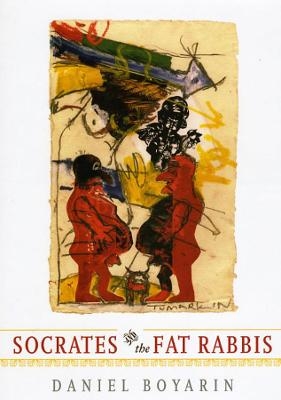
Socrates and the Fat Rabbis
Seiten
2012
University of Chicago Press (Verlag)
978-0-226-06917-3 (ISBN)
University of Chicago Press (Verlag)
978-0-226-06917-3 (ISBN)
What kind of literature is the Talmud? This title suggests that both the Platonic and the Talmudic dialogues are not dialogic at all. It singles out Menippean satire as the most important genre through which to understand both the Talmud and Plato, emphasizing their seriocomic peculiarity.
What kind of literature is the Talmud? To answer this question, Daniel Boyarin looks to an unlikely source: the dialogues of Plato. In these ancient texts he finds similarities, both in their combination of various genres and topics and in their dialogic structure. But Boyarin goes beyond these structural similarities, arguing also for a cultural relationship. In "Socrates and the Fat Rabbis", Boyarin suggests that both the Platonic and the Talmudic dialogues are not dialogic at all. Using Mikhail Bakhtin's notion of represented dialogue and real dialogism, Boyarin demonstrates, through multiple close readings, that the give-and-take in these texts is actually much closer to a monologue in spirit. At the same time, he shows that there is a dialogism in both texts on a deeper structural level between a voice of philosophical or religious dead seriousness and a voice from within that mocks that very high solemnity. Boyarin ultimately singles out Menippean satire as the most important genre through which to understand both the Talmud and Plato, emphasizing their seriocomic peculiarity.
An innovative advancement in rabbinic studies, as well as a bold and controversial new way of reading Plato, "Socrates and the Fat Rabbis" makes a major contribution to scholarship on thought and culture of the ancient Mediterranean.
What kind of literature is the Talmud? To answer this question, Daniel Boyarin looks to an unlikely source: the dialogues of Plato. In these ancient texts he finds similarities, both in their combination of various genres and topics and in their dialogic structure. But Boyarin goes beyond these structural similarities, arguing also for a cultural relationship. In "Socrates and the Fat Rabbis", Boyarin suggests that both the Platonic and the Talmudic dialogues are not dialogic at all. Using Mikhail Bakhtin's notion of represented dialogue and real dialogism, Boyarin demonstrates, through multiple close readings, that the give-and-take in these texts is actually much closer to a monologue in spirit. At the same time, he shows that there is a dialogism in both texts on a deeper structural level between a voice of philosophical or religious dead seriousness and a voice from within that mocks that very high solemnity. Boyarin ultimately singles out Menippean satire as the most important genre through which to understand both the Talmud and Plato, emphasizing their seriocomic peculiarity.
An innovative advancement in rabbinic studies, as well as a bold and controversial new way of reading Plato, "Socrates and the Fat Rabbis" makes a major contribution to scholarship on thought and culture of the ancient Mediterranean.
Daniel Boyarin is professor of Talmudic culture and holds the Herman P. and Sophia Taubman Chair in the Departments of Near Eastern Studies and Rhetoric at the University of California, Berkeley. He is the author, coauthor, editor, or coeditor of more than a dozen books, including, most recently, Border Lines: The Partition of Judaeo-Christianity.
| Sprache | englisch |
|---|---|
| Maße | 15 x 23 mm |
| Gewicht | 595 g |
| Themenwelt | Geisteswissenschaften ► Philosophie ► Philosophie Altertum / Antike |
| Geisteswissenschaften ► Religion / Theologie ► Judentum | |
| ISBN-10 | 0-226-06917-6 / 0226069176 |
| ISBN-13 | 978-0-226-06917-3 / 9780226069173 |
| Zustand | Neuware |
| Haben Sie eine Frage zum Produkt? |
Mehr entdecken
aus dem Bereich
aus dem Bereich
mit Sokrates, Seneca, Platon & Co. im Gespräch
Buch | Hardcover (2023)
FinanzBuch Verlag
18,00 €


